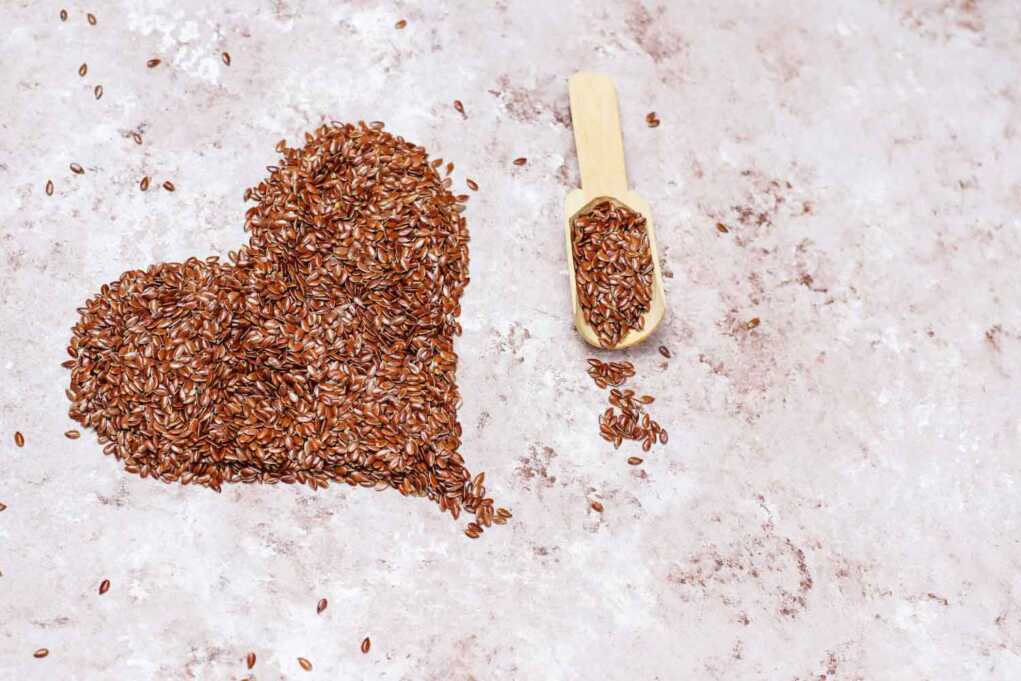
Exploring the transformative role of flaxseed in gut health for reducing breast cancer risk.
Study Insights: Flaxseed and Cancer Risk
The study published in Microbiology Spectrum examines the relationship between the gut’s microbiota—the trillions of microorganisms living in our intestines—and microRNAs (miRNAs) in the mammary gland. These miRNAs are crucial in controlling genes associated with breast cancer development.
Using young female mice, investigators examined the effects of lignans on the body. Lignans, natural fiber compounds found in flaxseed, have been associated with a reduced risk of breast cancer.
The findings revealed that flaxseed, through its unique compounds, works with gut bacteria to produce substances that can help prevent breast cancer. It particularly affects certain genetic elements in the mammary gland that are crucial in cancer prevention.
“Flaxseed is a source of lignan secoisolariciresinol diglucoside (SDG) and alpha-linolenic acid (ALA)-rich oil, both with antitumor effects,” the researchers told The Epoch Times. The research underscores that eating whole flaxseed is crucial for reaping its full health benefits. This finding stems from the observation that neither flaxseed oil nor the compound SDG alone can deliver the same effects as the entire flaxseed.
Flaxseed: Nature’s Superfood Explained
Flaxseed, often hailed as a “superfood,” has gained attention among health enthusiasts and the scientific community.
- Preventing breast, prostate, and colon cancer.
- Regulating blood sugar in Type-2 diabetes.
- Reducing high cholesterol.
- Alleviating menopausal symptoms.
- Treating constipation.
Flaxseed is abundant in omega-3 fatty acids, primarily in the form of alpha-linolenic acid, known for its anti-inflammatory effects. Reducing inflammation is crucial, as it plays a significant role in the development and progression of various diseases, including cancer.
They caution that flaxseed should be consumed as part of the diet, not as a supplement, and recommend eating moderate quantities of two to three tablespoons of ground flaxseed daily.
Ms. Comelli told The Epoch Times, “Clinical studies have shown that breast tumor growth in breast cancer patients is slowed down by the daily intake of 25 g flaxseed which contains 50 mg SDG. In premenopausal women with a high risk of breast cancer, the daily intake of 50 mg SDG for one year caused many biomarker changes in the breast suggesting reduced risk of developing breast cancer by 50%. All these suggest that intake of lignan-rich foods such as flaxseed—about one tablespoon a day—may provide some protection against breast cancer.”
Flaxseed is an excellent source of dietary fiber, which is associated with a reduced risk of chronic diseases, including some cancers. Fiber is vital for a healthy digestive system, robust immune function, and general health.
Flaxseed’s dietary versatility sets it apart. It can be easily added to a range of recipes—from smoothies to baked goods—offering an effortless method to enhance nutritional intake.
Future Implications: Diet and Cancer Prevention
The research on flaxseed’s potential to mitigate breast cancer risk signifies a breakthrough in dietary strategies for disease prevention. It adds to the mounting evidence of a substantial connection between our diet and overall health—especially regarding cancer prevention.
The implications of this research are significant. Jennifer Auchtung, assistant professor at the University of Nebraska–Lincoln, stated in the news release, “The gastrointestinal microbiota significantly alters various dietary components, affecting human health.” As research delves into the diet-health nexus, it underscores preventive health care’s focus on dietary choices as essential as medical interventions.
The study paves the way for more tailored dietary guidelines. Its aim extends beyond treating diseases to preventing them—particularly cancers—through nutrient-rich natural foods. This resonates with the increasing public inclination towards holistic health, potentially reshaping our understanding of diet and health.
Important Notice: This article was originally published at www.theepochtimes.com by Sheramy Tsai where all credits are due.
Disclaimer
The watching, interacting, and participation of any kind with anything on this page does not constitute or initiate a doctor-patient relationship with Dr. Farrah™. None of the statements here have been evaluated by the Food and Drug Administration (FDA). The products of Dr. Farrah™ are not intended to diagnose, treat, cure, or prevent any disease. The information being provided should only be considered for education and entertainment purposes only. If you feel that anything you see or hear may be of value to you on this page or on any other medium of any kind associated with, showing, or quoting anything relating to Dr. Farrah™ in any way at any time, you are encouraged to and agree to consult with a licensed healthcare professional in your area to discuss it. If you feel that you’re having a healthcare emergency, seek medical attention immediately. The views expressed here are simply either the views and opinions of Dr. Farrah™ or others appearing and are protected under the first amendment.
Dr. Farrah™ is a highly experienced Licensed Medical Doctor certified in evidence-based clinical nutrition, not some enthusiast, formulator, or medium promoting the wild and unrestrained use of nutrition products for health issues without clinical experience and scientific evidence of therapeutic benefit. Dr. Farrah™ has personally and keenly studied everything she recommends, and more importantly, she’s closely observed the reactions and results in a clinical setting countless times over the course of her career involving the treatment of over 150,000 patients.
Dr. Farrah™ promotes evidence-based natural approaches to health, which means integrating her individual scientific and clinical expertise with the best available external clinical evidence from systematic research. By individual clinical expertise, I refer to the proficiency and judgment that individual clinicians acquire through clinical experience and clinical practice.
Dr. Farrah™ does not make any representation or warranties with respect to the accuracy, applicability, fitness, or completeness of any multimedia content provided. Dr. Farrah™ does not warrant the performance, effectiveness, or applicability of any sites listed, linked, or referenced to, in, or by any multimedia content.
To be clear, the multimedia content is not intended to be a substitute for professional medical advice, diagnosis, or treatment. Always seek the advice of your physician or other qualified health providers with any questions you may have regarding a medical condition. Never disregard professional medical advice or delay in seeking it because of something you have read or seen in any website, video, image, or media of any kind. Dr. Farrah™ hereby disclaims any and all liability to any party for any direct, indirect, implied, punitive, special, incidental, or other consequential damages arising directly or indirectly from any use of the content, which is provided as is, and without warranties.








